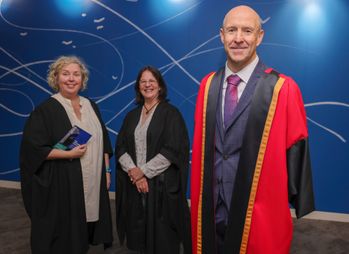
On 14 November 2025, Professor John Kelleher delivered an opening address as Chair of Computer Science at Trinity College Dublin. The talk, given in the Trinity Business School auditorium, focused on how machine‑learning models that incorporate age as a nuanced, data‑driven feature can improve stroke risk prediction and patient outcomes. The lecture attracted senior university leaders, industry partners, and a full house of students and researchers.
Key Themes of the Inaugural Address
Professor Kelleher outlined the evolution of computational methods applied to health data, tracing advances from simple weighted‑sum algorithms to modern deep‑learning architectures. He stressed that while age remains a dominant predictor in cardiovascular risk, treating it as a raw chronological number can misrepresent the true risk profile. By applying hierarchical modeling and natural language processing techniques to patient records, researchers can untangle the complex interactions between biological age, lifestyle factors, and clinical variables.
Interpretable Models for Real‑World Decision Support
The lecture emphasized the trade‑off between predictive performance and interpretability. In many clinical settings, clinicians require explanations of why a model returns a specific risk score. Professor Kelleher showcased a prototype risk calculator that highlights the relative contribution of age, blood pressure, and genetic markers. The tool uses transparent rule‑based constraints to ensure that the weighted contributions are auditable and communicable to patients.
Data Quality and Ethical Considerations
He addressed the importance of clean, longitudinal data for training reliable models. Examples from the ADAPT Centre’s cohort studies illustrate how missing data can be handled through imputation strategies that preserve the underlying age distribution. Ethical questions—such as the potential for age‑based bias—were also explored, underscoring the need for rigorous validation on diverse populations.
Implications for Health Practitioners
For clinicians, the practical takeaway is the availability of risk scores that integrate age in a more refined manner. Rather than applying a universal age threshold, practitioners can now visualize a patient’s risk curve across a spectrum of ages, aiding shared decision‑making. For instance, a 55‑year‑old patient with a high smoking history may receive a personalized recommendation for earlier intervention based on a model that weighs age against other risk factors more aggressively.
Implementing Age‑Aware Models in Electronic Health Records
Integrating the model into existing electronic health record (EHR) platforms involves mapping structured data fields and ensuring that the inference engine runs in real time. Trinity’s IT Infrastructure team has already piloted a prototype within a local hospital, demonstrating reductions in screening intervals for high‑risk patients.
Ongoing Collaboration Opportunities
Professor Kelleher called on hospitals and research institutes to partner with the ADAPT Centre. The collaboration framework enables data sharing under strict privacy protocols, allowing joint projects to refine models and test their impact in outpatient settings. Researchers interested in health informatics can submit proposals through the Centre’s annual call for projects.
Academic Pathways at Trinity College Dublin
Trinity College Dublin offers a Master’s programme in Artificial Intelligence in Health, which covers the statistical foundations, algorithmic design, and ethical aspects of applying AI in clinical practice. Students gain hands‑on experience with real patient datasets and collaborate with industry partners on prototype solutions.
Program Highlights
- Core modules on machine learning, data ethics, and health economics.
- Research project supervised by faculty from the Computer Science, Medicine, and Public Health faculties.
- Opportunities to present findings at the annual AI in Health symposium hosted by the ADAPT Centre.
Next Steps and Resources
For those interested in applying machine‑learning models to their own clinical data, the ADAPT Centre provides consultancy services. Academics can explore joint funding opportunities with the Irish Research Council. Health practitioners can download the open‑source risk calculator developed during the lecture, which is available under a Creative Commons license.
Visit the ADAPT Centre website to learn more about current projects and how to get involved.
To understand how AI can improve patient outcomes beyond stroke risk, explore Trinity’s Health Analytics MSc offered in partnership with the School of Biomedicine.
If you would like to discuss the applicability of these models in your own setting, contact Trinity College Dublin’s admissions office or fill out the inquiry form on the ADAPT Centre page.
For additional insights into age‑based risk stratification, read the full lecture transcript and supplementary materials posted on Trinity’s news archive.

